
家庭馆亚 单元总结
单 元 总 结
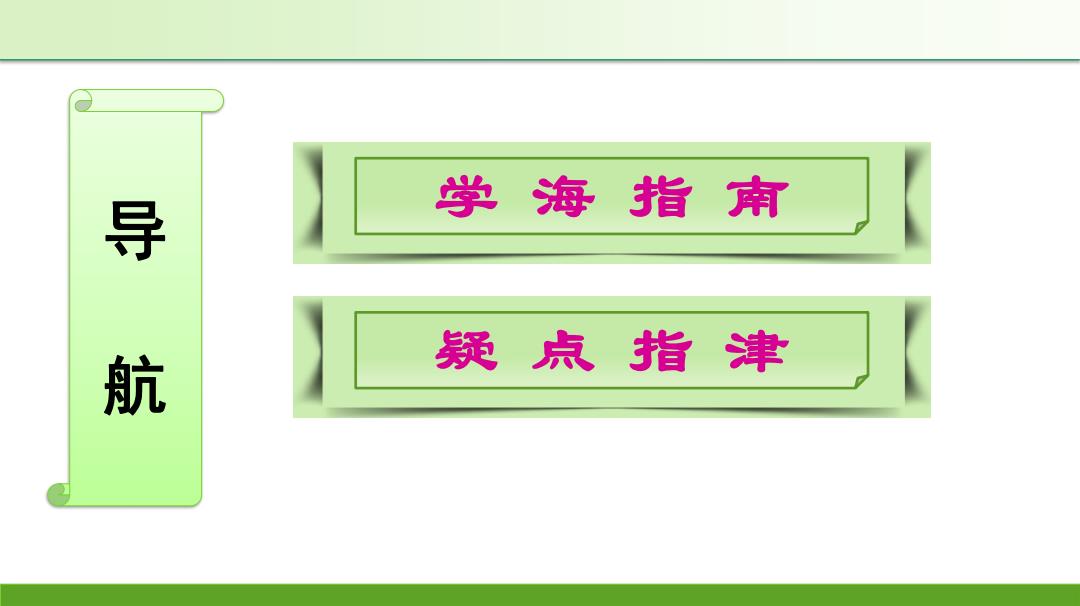
导 学海指南 航 疑点指津
导航 学 海 指 南 疑 点 指 津
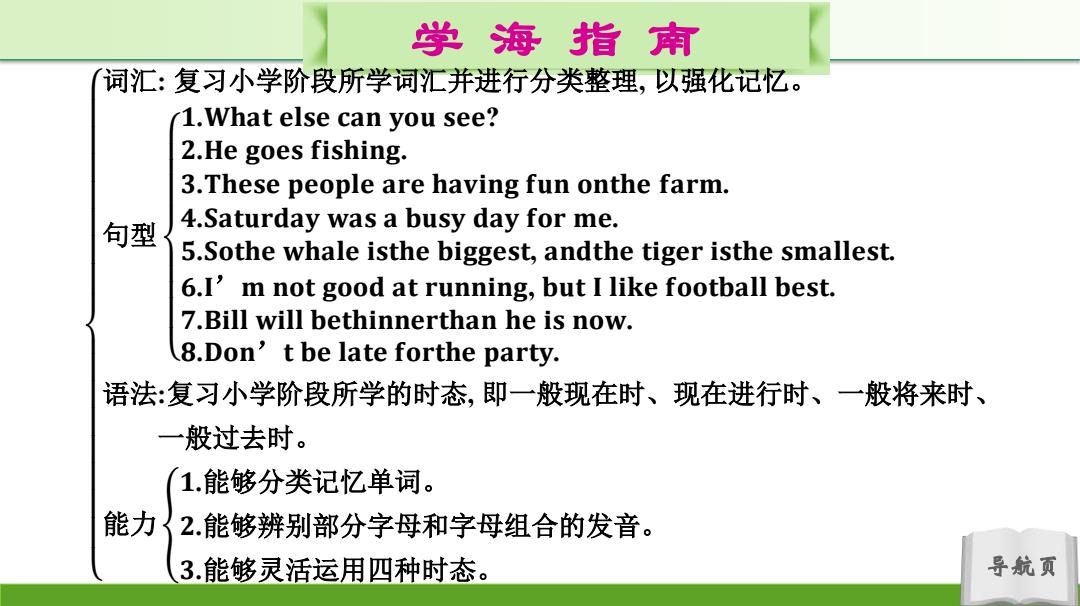
学海指南 词汇:复习小学阶段所学词汇并进行分类整理,以强化记忆。 1.What else can you see? 2.He goes fishing. 3.These people are having fun onthe farm. 句型 4.Saturday was a busy day for me. 5.Sothe whale isthe biggest,andthe tiger isthe smallest. 6.I'm not good at running,but I like football best. 7.Bill will bethinnerthan he is now. 8.Don't be late forthe party. 语法:复习小学阶段所学的时态,即一般现在时、现在进行时、一般将来时、 一般过去时。 1.能够分类记忆单词。 能力{2.能够辨别部分字母和字母组合的发音。 3.能够灵活运用四种时态。 导航页
导航页 学 海 指 南 词汇: 复习小学阶段所学词汇并进行分类整理, 以强化记忆。 句型 𝟏.𝐖𝐡𝐚𝐭 𝐞𝐥𝐬𝐞 𝐜𝐚𝐧 𝐲𝐨𝐮 𝐬𝐞𝐞? 𝟐.𝐇𝐞 𝐠𝐨𝐞𝐬 𝐟𝐢𝐬𝐡𝐢𝐧𝐠. 𝟑.𝐓𝐡𝐞𝐬𝐞 𝐩𝐞𝐨𝐩𝐥𝐞 𝐚𝐫𝐞 𝐡𝐚𝐯𝐢𝐧𝐠 𝐟𝐮𝐧 𝐨𝐧𝐭𝐡𝐞 𝐟𝐚𝐫𝐦. 𝟒.𝐒𝐚𝐭𝐮𝐫𝐝𝐚𝐲 𝐰𝐚𝐬 𝐚 𝐛𝐮𝐬𝐲 𝐝𝐚𝐲 𝐟𝐨𝐫 𝐦𝐞. 𝟓.𝐒𝐨𝐭𝐡𝐞 𝐰𝐡𝐚𝐥𝐞 𝐢𝐬𝐭𝐡𝐞 𝐛𝐢𝐠𝐠𝐞𝐬𝐭, 𝐚𝐧𝐝𝐭𝐡𝐞 𝐭𝐢𝐠𝐞𝐫 𝐢𝐬𝐭𝐡𝐞 𝐬𝐦𝐚𝐥𝐥𝐞𝐬𝐭. 𝟔.𝐈’𝐦 𝐧𝐨𝐭 𝐠𝐨𝐨𝐝 𝐚𝐭 𝐫𝐮𝐧𝐧𝐢𝐧𝐠, 𝐛𝐮𝐭 𝐈 𝐥𝐢𝐤𝐞 𝐟𝐨𝐨𝐭𝐛𝐚𝐥𝐥 𝐛𝐞𝐬𝐭. 𝟕.𝐁𝐢𝐥𝐥 𝐰𝐢𝐥𝐥 𝐛𝐞𝐭𝐡𝐢𝐧𝐧𝐞𝐫𝐭𝐡𝐚𝐧 𝐡𝐞 𝐢𝐬 𝐧𝐨𝐰. 𝟖.𝐃𝐨𝐧’𝐭 𝐛𝐞 𝐥𝐚𝐭𝐞 𝐟𝐨𝐫𝐭𝐡𝐞 𝐩𝐚𝐫𝐭𝐲. 语法:复习小学阶段所学的时态, 即一般现在时、现在进行时、一般将来时、 一般过去时。 能力 𝟏.能够分类记忆单词。 𝟐.能够辨别部分字母和字母组合的发音。 𝟑.能够灵活运用四种时态

疑点指津 一、一般现在时的相关句式 (一)第三人称单数做主语时 肯定句:Mary does her homework every day.. 否定句:Mary doesn't do her homework every day. 一般疑问句:Does Mary do her homework every day? ▣答:Yes,she does..No,she doesn’t. 导航页
导航页 疑 点 指 津 一、一般现在时的相关句式 (一)第三人称单数做主语时 肯定句: Mary does her homework every day. 否定句: Mary doesn’t do her homework every day. 一般疑问句: Does Mary do her homework every day? 回答: Yes, she does. /No, she doesn’t
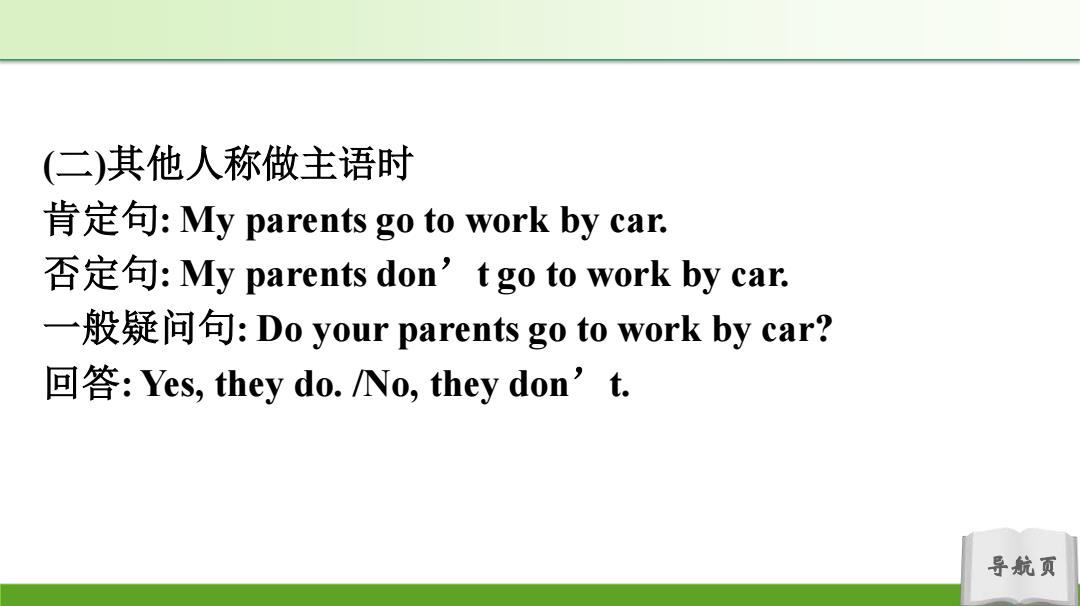
(二)其他人称做主语时 肯定句:My parents go to work by car. 否定句:My parents don't go to work by car. 一般疑问句:Do your parents go to work by car? ▣答:Yes,they do.No,they don’t. 导航页
导航页 (二)其他人称做主语时 肯定句: My parents go to work by car. 否定句: My parents don’t go to work by car. 一般疑问句: Do your parents go to work by car? 回答: Yes, they do. /No, they don’t
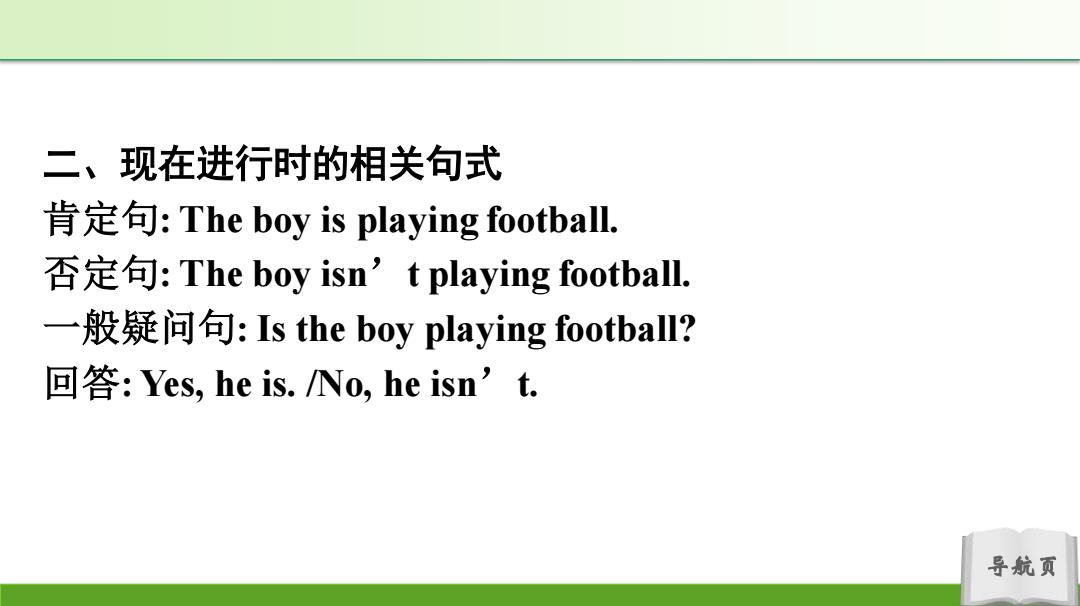
二、现在进行时的相关句式 肯定句:The boy is playing football.. 否定句:The boy isn't playing football.. 一般疑问句:Is the boy playing football? ▣答:Yes,heis.No,he isn’t. 导航页
导航页 二、现在进行时的相关句式 肯定句: The boy is playing football. 否定句: The boy isn’t playing football. 一般疑问句: Is the boy playing football? 回答: Yes, he is. /No, he isn’t

三、一般将来时的相关句式 肯定句:Ve will go to the zoo tomorrow. 否定句:Ve won’t go to the zoo tomorrow. 一般疑问句:Will you go to the z0 o tomorrow? ▣答:Yes,we will.No,we won’t. 导航页
导航页 三、一般将来时的相关句式 肯定句: We will go to the zoo tomorrow. 否定句: We won’t go to the zoo tomorrow. 一般疑问句: Will you go to the zoo tomorrow? 回答: Yes, we will. /No, we won’t
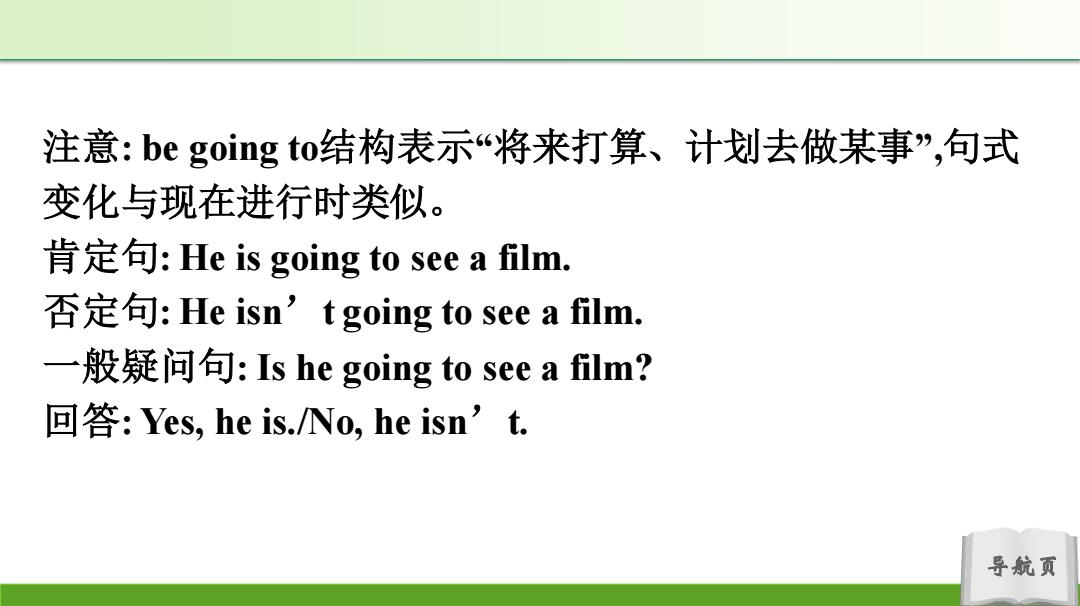
注意:be going to结构表示“将来打算、计划去做某事”,句式 变化与现在进行时类似。 肯定句:He is going to see a film. 否定句:He isn't going to see a film. 一般疑问句:Is he going to see a film? ▣答:Yes,heis.No,he isn't. 导航页
导航页 注意: be going to结构表示“将来打算、计划去做某事”,句式 变化与现在进行时类似。 肯定句: He is going to see a film. 否定句: He isn’t going to see a film. 一般疑问句: Is he going to see a film? 回答: Yes, he is./No, he isn’t
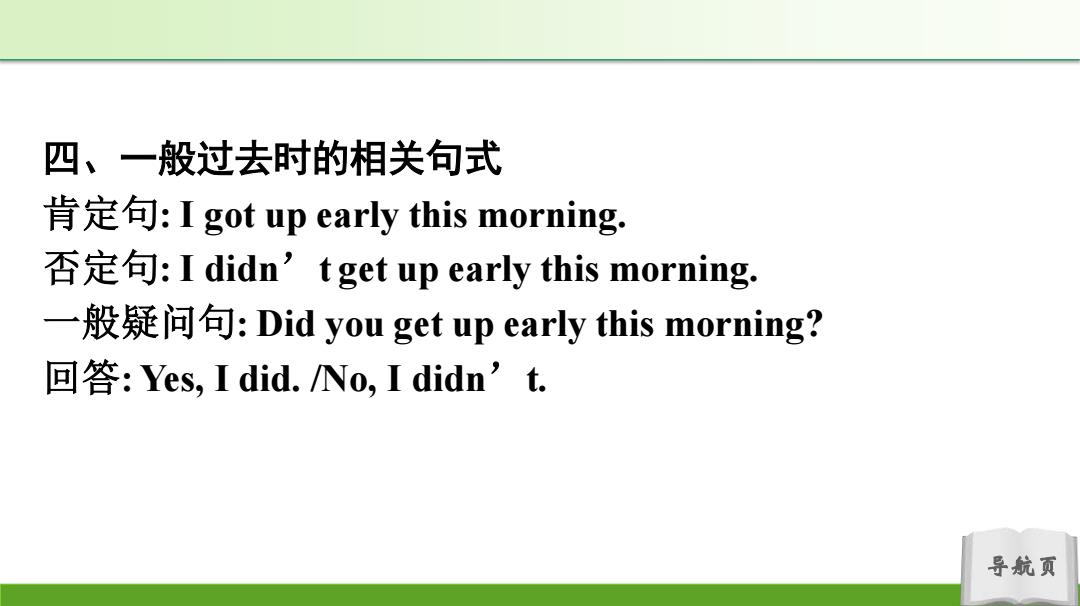
四、一般过去时的相关句式 肯定句:I got up early this morning. 否定句:I didn’t get up early this morning. 一般疑问句:Did you get up early this morning? ▣答:Yes,Idid.No,I didn’t. 导航页
导航页 四、一般过去时的相关句式 肯定句: I got up early this morning. 否定句: I didn’t get up early this morning. 一般疑问句: Did you get up early this morning? 回答: Yes, I did. /No, I didn’t
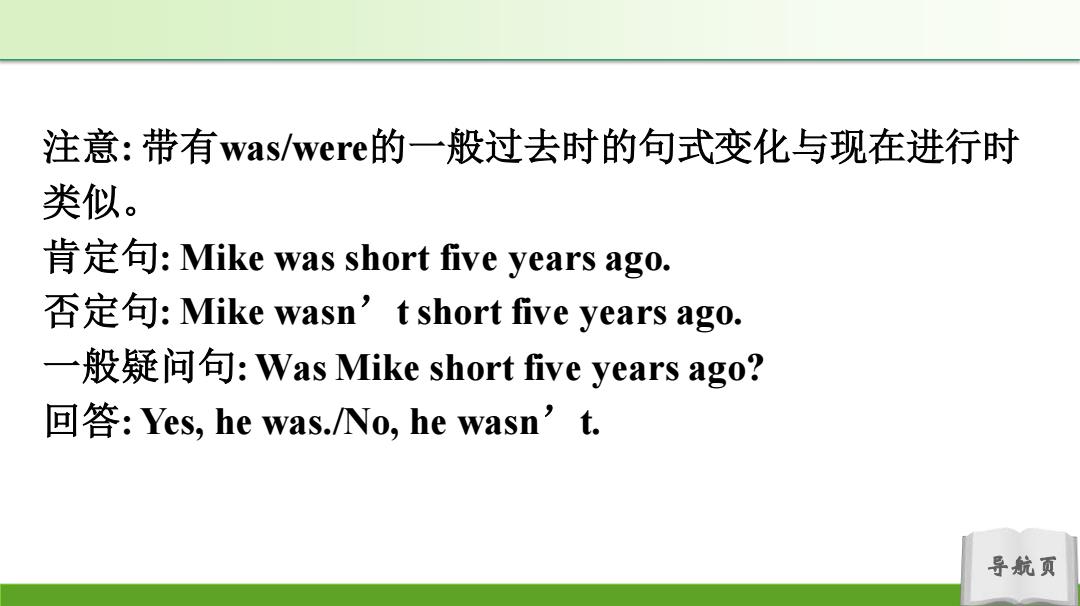
注意:带有was/were的一般过去时的句式变化与现在进行时 类似。 肯定句:Mike was short five years ago. 否定句:Mike wasn't short five years ago. 一般疑问句:Vas Mike short five years ago? ▣答:Yes,he was.No,he wasn’t. 导航页
导航页 注意: 带有was/were的一般过去时的句式变化与现在进行时 类似。 肯定句: Mike was short five years ago. 否定句: Mike wasn’t short five years ago. 一般疑问句: Was Mike short five years ago? 回答: Yes, he was./No, he wasn’t